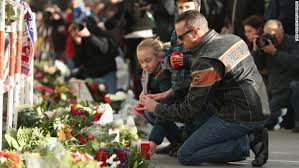| Online: | |
| Visits: | |
| Stories: |
After Paris attacks change in Syria becomes more essential

Following a series of dreadful attacks targeting “all of humanity” in Paris while taking the lives of 129 people and wounding more than 350, the need for change in Syria has become more essential ever before. The massacre of the Syrian people at the hands of the Levant dictator Bashar Assad, supported by Iran and Russia, parallel to Tehran’s years of deadly meddling in Iraq intensifying after the U.S. withdrawal, have all paved the grounds for the rise of the Islamic State of Iraq and Syria, or Daesh as it should be called since it has nothing to do with Islam. While the ayatollahs in Tehran resemble the “head of the snake” of Islamic fundamentalism and extremism, the first major step that must be taken by the international community is to bring about change in Syria and have Assad step down immediately.
As diplomats gathering in Vienna reached an agreement on Saturday over a timeline to realize political transition in Syria aimed at stopping the country’s horrific civil war, essential specifics such as the fate of Assad have been left not finalized. U.S. Secretary of State John Kerry declared there has been an agreement to launch talks between Syrian opposition groups and Damascus on January 1st, 2016.
While these measures are necessary to accelerate movement to bring an end to the bloody civil war in Syria as it unfortunately reaches its 5th year anniversary, one issue must be taken into consideration: the threat remains for Assad advocates, being Iran and Russia, to disrupt these efforts, stall any measures allowing Assad to remain in power and continue his carnage against innocent Syrians.
Along with this political effort, there should be a deadline placed for these attempts since we have seen this war continue for too long. When Saudi Arabia spearheaded an Arab coalition to make a firm stance back in March against Iran-backed Houthis in Yemen, this caught Tehran off guard and was the first strong Arab stance against the ayatollahs in decades. Iran is losing ground in Yemen fast and this has shown how Iran only respects a language of force. We have seen how Tehran has taken advantage of appeasement, conciliation and never ending talks regarding issues such as Iraq, Syria, Yemen and of course its dangerous nuclear weapons program. However, the Saudi-led Arab campaign against the Iran-backed Houthis opened eyes everywhere and made many realize that when needed, there should be a strong will to take dire action on the ground to push back the advocates of Islamic fundamentalism, extremism and terrorism.
More than 300,000 people, most civilians, have been killed in the Syria civil war and Bashar Assad has shown no intention to end this bloodbath. Reports also indicate a whopping 11 million have been forced into migration from their homes to other areas inside the country or displaced abroad in countries such as Turkey, Jordan, Lebanon, Iraq and beyond. Europe has joined Syria’s neighbors in desperately struggling to handle the most horrible migrant crisis since the ravage of World War II. Many reports indicate the possibility of Daesh terrorists smuggling into Europe amongst the hundreds of thousands of refugees who resorted to desperate measures to reach a safe environment in Europe. Others theories are raising the likelihood of Daesh being able to radicalize French-born youths to carry out these horrific attacks.
Anyhow, the important issue in this regard is to prevent these attacks of becoming the new normal before we are forced to grip with such horrific scenes, and the roots of this crisis must be targeted today, not tomorrow. Daesh has fortified its caliphate in Syria and Iraq. In both countries the international community has friends on the ground that have been largely neglected, yet present the best possible answer.
In Syria there are many groups representing thousands of moderate armed fighters who have sacrificed their all since 2011, such as the Free Syrian Army. But unfortunately, the West has not stepped up to provide the air support and safe zones on their home soil that they need to springboard their campaign and topple the Assad regime. As the West hesitated, Russia and Iran have pumped their ally in Syria. If the United States provides the air cover they need, moderate Syrian opposition fighters will easily be able to gain ground and force Assad to flee the country, allowing the eventual establishment of a democratic state. All without any significant dispatch of U.S. or European boots on the ground.
In Iraq the scene is very similar. As we recently witnessed in the north, U.S.-led coalition provided air cover for Kurdish and Yazidi fighters on the ground to rout Daesh out of the strategic city of Sinjar situated between Mosul, Iraq’s 2nd largest city, and Raqqa in Syria, the self-proclaimed capital of the Daesh caliphate. All without any significant US ground force presence. The U.S.-led coalition should advance on this victory and start providing similar support for locals Sunnis in al-Anbar and Salahadin province of Iraq to defeat Daesh. Instead of unwittingly becoming the air force of Iran-backed Shiite extremist militias under the command of Iran’s notorious Quds Force chief Qassem Suleimani, America and its allies should back the Sunnis who proved their efficiency once before back in 2006 and 2007 against al-Qaeda in Iraq.
What is necessary is a strong will from the West after receiving an unfortunate wakeup call in Paris. And these efforts should all start on the ground in Syria. This is owed to the innocent people who have lost their lives in the Middle East as a result of all these atrocities, and now those who are being targeted in the West.
Basiri is an Iranian human rights activist and supporter of democratic regime change in Iran. Follow him on Twitter: @Amir_bas




